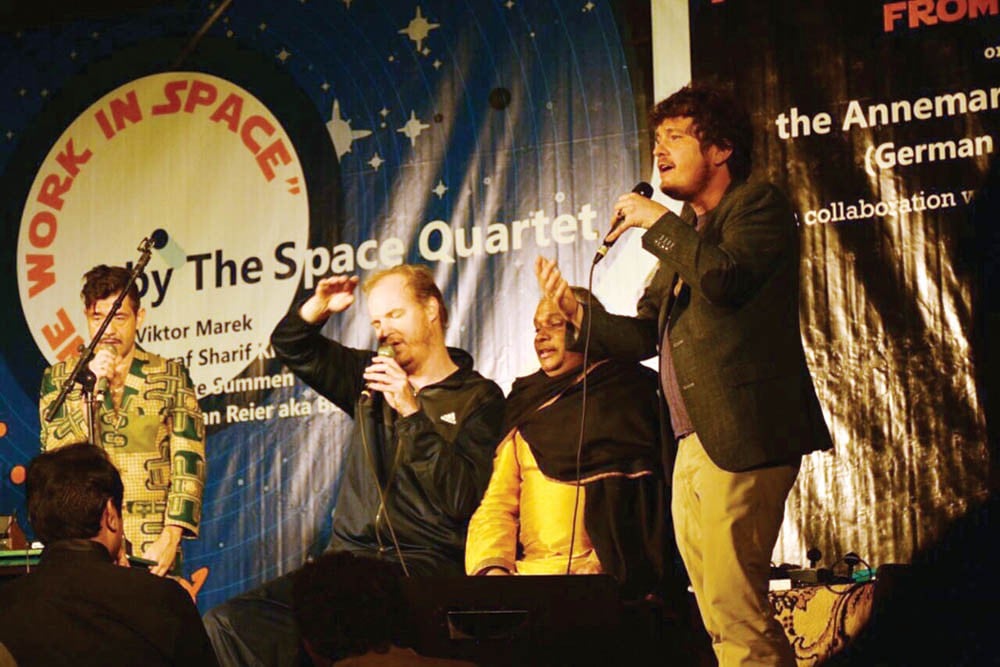
Ustad Ashraf Sharif Khan’s visit to Lahore brought with it a new kind of international music that has given voice to old Pakistani hits

Ustad Ashraf Sharif Khan migrated to Germany about twenty years ago and one wondered what he did there, particularly in terms of music. He has been coming to Pakistan on a regular basis to visit family and friends and also to give a good account of himself in the conventional sitar-playing sessions that he is invited to during his visits. A couple of times he has come back with groups that he has been performing with in his two-decade stay in Germany and larger Europe to give a glimpse in a concert or two, and here he was again last week with three of his German musicians Viktor Marek, Maurice Summen and Sebastian Reier (aka Booty Carrell). With them, he held performances in Lahore, Karachi and Islamabad, exposing a side of himself that we are not very familiar with in Pakistan.
Two of these musicians, Maurice Summen and Booty Carrell (Sebastian Reier) from Berlin have been involved in the development of an initiative which they have called "Cosmic Music Project Spacefuzzy" revolving round the creation of a new sound. They co-opted Ashraf Sharif Khan and Viktor Marek as all four of them have been working on projects with many dimensions to it.
Influenced by music inspired by the sufis, they have been reviving neglected world hits with the express purpose of creating a reworked, meshed sound, a combination of the contemporary sonic feel with its roots in the music of the Punjab, particularly its sufic variation.
Booty Carrell is a vinyl archaeologist, an outernational DJ who is known for his efforts towards reviving neglected world hits, an effort that has had a huge impact in the past. It appears that the role of the DJ is undergoing a change. Instead of just playing recorded music, it seems that now the scope is being widened. His work is now more than just his choice of music to be played; it is the sequencing, the selection and then what everyone in that particular group can be best entertained with, the improvisational ability as to what to play, which may not have been scripted beforehand but can be only done by reliance on instinctual responses.
With recorded music, its streaming and the huge input of digital and massive post-production lay-ons the music scene is undergoing a huge change with emphasis shifting to the editing and reworking of recorded sound. Probably, the definitions too have undergone a change as editing, playing and post-production additions and subtractions are now being seen as part of the creative endeavour.
Booty Carell is particularly an intriguing artist because the recorded music that he plays is from the vinyl records or discs which were the first form of recordings that one got familiar with. From the earliest recordings, the switchover to vinyl was seen as a quantum jump because this was more durable and well-produced sound than the initial attempts. With the passage of time, its quality improved further with the forty-five and thirty-three rpms and then sadly it all disappeared with the arrival of the cassettes and CD technology and then MP3. But of late, vinyl records are staging a comeback as it is being said that its sound quality is unmatched to the later recordings and technological improvements.
As it is, when something loses its functional value, it comes back as heritage, or with iconic overtones or some specialised overlay to be possessed for its own sake. This is what is happening to these records as these are being seen as treasured items meant for niche audiences.
The records that Booty Carell had were many, not only of Pakistani film and popular music, some of classical music as well, particularly the sitar as rendered by Ustad Sharif Khan. Calling himself a vinyl archeologist, a new term in Pakistan, he hoards these and has a vast collection with particular focus on music produced in Pakistan. It was a delight to listen to these records being played in a concert with live music as well. While Ashraf Sharif Khan played the sitar, the recorded music was interjected, creating a kind of conviviality that facilitated the audiences to not just sit, but also to dance.
This has been the effort by this group to keep Pakistani music heard and be made part of the mainstream popular sonic culture. By developing a new form of Pakistani music over the past years, deeply rooted in the tradition of Punjabi Sufi music, whilst employing sounds and techniques of the so called western club culture, they have created a sound called Sufi Step.
This is how Pakistani music is being billed these days internationally. It appears to be essential to have the tag of sufi attached to it for it is no longer classical or folk but subsumed under the generic ‘sufi’. Probably this is how the Muslim society’s music is being accepted and made palatable.